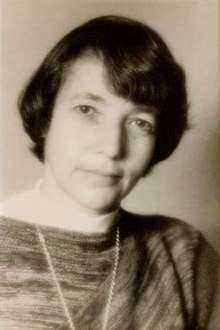Leonore Davidoff
Leonore Davidoff (31 January 1932 – 19 October 2014) was a feminist historian and sociologist who pioneered new approaches to women's history and gender relations, including through her analysis of the gendered division of roles in public and private spheres.[1][2] She helped create the Feminist Library in London in 1975.[1] She was also the founding editor of the academic journal Gender & History.[1][3] For much of her academic career, Davidoff was based at the University of Essex in the UK, and was a Professor Emerita when she died.[4][5]

Biography
Davidoff was born in New York City in 1932, as the second of four children of Ida and Leo Davidoff. [3] Davidoff's later childhood in a white Protestant community in Connecticut, served as an "early lesson in marginality".[3] Her father (a Latvian immigrant) became a neurosurgeon who started the Albert Einstein College of Medicine, and her mother (born in Boston to Lithuanian immigrants) was an early women's rights supporter and marriage counselor. Her brother and older sister were also doctors.[1][3]
Davidoff, however, chose to study music as a first degree at Oberlin College Ohio, later switching to sociology. She went on to do an MA at the London School of Economics (LSE) in 1956.[2] Her master's thesis was on the Employment of Married Women, and a foundation to her life's work in the research field of women's history. Still, the thesis remained unpublished; at the time, there was "no Feminist Movement to relate to, and she could not see any future in it."[6][4][5]
It was in her first year at LSE that Davidoff met David Lockwood, then a PhD student in sociology, who would go on to do significant research on the nature of class in Britain. They married in 1954.[1] For a while after the birth of her three sons, from 1956 onwards, Davidoff focused on her family and lost any basis for institutional research. While a lifelong and "remarkable" marriage, Lockwood and she "did not forge an intellectual partnership": he continued to centre his work on issues of class, and did not pay attention to gender as a critical social dimension.[6][4]
After a few years of feeling isolated and "'around the colleges but not in them'", Davidoff found support and connections at the Lucy Cavendish College in Cambridge for mature women.[1] When Lockwood moved to the University of Essex in 1968 as a professor in sociology, Davidoff began working there as a research officer. She became a lecturer in social history in 1975 and taught the UK's first MA in women's history.[1] In 1990, she was made a research professor, retiring a few years later. David Lockwood died a few months before Davidoff, in June 2014. She is survived by her three sons, Ben, Matthew and Harold, and their families.[5][1] At her request, her funeral on 3 November 2014 opened with the poem The Road Not Taken, by Robert Frost.[5]
Work
Davidoff is best known for her book Family Fortunes, written in 1987 with Catherine Hall.[1] As the sociologist and oral historian, Paul Thompson, put it: "it is a brilliant demonstration of the new insights which gender perspectives can yield".[3] Using case studies of middle-class family and business relationships in urban Birmingham and rural East Anglia, Davidoff and Hall traced the evolution of capitalist enterprise in England at the end of the 18th century. They demonstrated the gendered division of labour through an examination of the family, the economy and religious belief: in particular, the way men operated in the public sphere, and women, in the private, domestic sphere.[1][3][5] Davidoff and Hall described Family Fortunes as "... a book about the ideologies, institutions and practices of the English middle class from the end of the eighteenth to the mid nineteenth centuries[...] The principle argument rests on the assumption that gender and class always operate together, that consciousness of class always takes a gendered form."[7]
Selected publications
- With Doolittle, M., J. Fink and K. Holden. The Family Story: Blood, Contract and Intimacy, London and New York: Longman, 1999
- With Hall, C. Family Fortunes: Men and Women of the English Middle Class 1780-1850, Chicago: University of Chicago Press, 1987
- With Westover, B. Our Work, Our Lives, Our Words: Women’s History and Women’s Work, Totowa, New Jersey: Barnes and Noble Books, 1986
References
- John, Angela V. (6 November 2014). "Leonore Davidoff obituary". The Guardian www.theguardian.com. Retrieved 19 November 2014.
- Reisz, Matthew (13 November 2014). "Leonore Davidoff, 1932-2014". Times Higher Education www.timeshighereducation.co.uk. Retrieved 19 November 2014.
- Thompson, Paul (19 November 2014). "Leonore Davidoff". The Independent www.independent.co.uk. Retrieved 19 November 2014.
- "Department of Sociology". University of Essex www.essex.ac.uk. Archived from the original on 29 November 2014. Retrieved 19 November 2014.
- "Leonore Davidoff 1932-2014". Essex Sociology Alumni essexsociologyalumni.com/. Retrieved 22 November 2014.
- "Leonore Davidoff obituary by Paul Thompson". Essex Sociology Alumni essexsociologyalumni.com. Retrieved 22 November 2014.
- Davidoff, Lenore; Hall, Catherine (27 August 1991). Family Fortunes: Men and Women of the English Middle Class 1780-1850. The University of Chicago Press. p. 13.